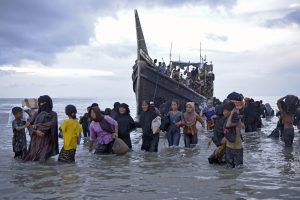More Rohingya asylum seekers were reported killed or missing while attempting to flee Myanmar and Bangladesh last year than in nearly a decade, according to the United Nations refugee agency, which called for coordinated action to protect the ethnic minority group.
In a statement yesterday, UNHCR spokesperson Matthew Saltmarsh said that the agency was alarmed by the “surge” in the number of desperate Rohingya refugees seeking sanctuary by sea.
At least 569 Rohingya were reported to have died or gone missing while trying to flee Myanmar or Bangladesh in 2023, he said, the highest toll since 2014. This amounted to nearly one in eight of the nearly 4,500 people who attempted the journey in 2023, which it described also as “a significant increase on previous years.”
“UNHCR calls on regional coastal authorities to take urgent action to prevent future tragedies,” Saltmarsh said in the statement. “Saving lives and rescuing those in distress at sea is a humanitarian imperative and a longstanding duty under international maritime law.”
According to UNHCR, last year’s death toll rose by more than 200 over the previous year. Much of this was down to a single incident in November 2023, when some 200 Rohingya are believed to have lost their lives when their boat was reported to have sunk in the Andaman Sea.
“These figures provide a chilling reminder that failure to act to save people in distress results in deaths,” Saltmarsh said. “More and more desperate people are dying under the watch of numerous coastal States in the absence of timely rescue and disembarkation to the nearest place of safety.”
The UNHCR figures confirm what has been suspected since mid-November, when clusters of leaky boats carrying Rohingya asylum seekers, most of them women and children, began landing on the shores of western Indonesia, most of them in Aceh. (Most boat voyages take place between November and March, when the weather in the notoriously cyclone-prone Bay of Bengal is least forbidding).
While a small number are attempting to escape conditions in Myanmar’s Rakhine State, where Rohingya continue to face severe controls on their movement, most are seeking sanctuary from the heaving, unsanitary, and crime-ridden refugee camps of southern Bangladesh, which are home to nearly 1 million people. Most have languished there since August 2017, when Myanmar’s military launched a “clearance operation” in northern Rakhine State, following scattered attacks by Rohingya militants.
The offensive, which experts have described both as “genocide” and a “textbook case of ethnic cleansing,” saw Myanmar soldiers and local vigilantes kill at least 6,700 people and expel more than 740,000 while shooting livestock and torching dozens of villages.
The spike in perilous ocean journeys is a sign of the increasingly desperate conditions in the refugee camps of southeastern Bangladesh, which are deteriorating as crime runs rampant and international agencies slash their assistance. The Bangladeshi government, concerned about the Rohingya becoming permanent residents, has also imposed tight controls on refugees’ movement and ability to work.
In a recent analysis of the situation in the camps, the International Institute for Strategic Studies described a “a vicious cycle of insecurity” in the camps, which has left Rohingya refugees “with no good options.”
Since the military coup in Myanmar in February 2021, a voluntary return to Rakhine State has become a very remote prospect. As a result, many are driven to extreme lengths, including paying people smugglers for a small piece of deck space on a leaky and overburdened vessel, in pursuit of a new life abroad.
The UNHCR figures demonstrate that absent a substantial improvement in the conditions of the camps, let alone in Rakhine State, such boat arrivals are likely to continue – and that the best the outside world can do is to do what it can to minimize the number of people killed in these dangerous sea crossings.

































